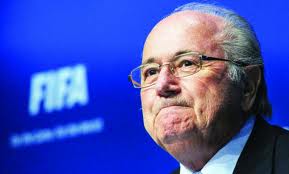By Andrew Warshaw, chief correspondent
March 22 – It was the briefest of interventions but it provided a telling insight into the tensions of the previous two days and the current state of play.
“We can say our reform process is on track,” Blatter made a point of telling his audience. Then came a significant rider. Most of the “big list” of state-changing proposals for bringing credibility and transparency back to the organisation had been approved and passed on for rubber-stamping by the entire 209-nation membership at FIFA’s congress in May, said Blatter, “even if perhaps not in the form that everybody was hoping.”
That was key phrase. For all Blatter’s talk of unity – and there was plenty – it now seems likely that a chunk of the reform package – two years in the making – will either be watered down or challenged when it is put to the vote in Mauritius. The fall guy was undoubtedly Mark Pieth, the Swiss professor drafted in to mastermind change but who now finding himself very much on the outside.
One of Pieth’s ideas was that FIFA itself impose integrity checks on high-level appointments to stop dubious characters holding power and avoid the kind of suspensions and expulsions that have plagued the organisation in recent months. Instead, following opposition by UEFA, such checks will instead be left to the six confederations with FIFA’s much-touted audit and compliance committee having hardly any influence.
Theo Zwanziger, the former German FA federation president now leading the reform process into its final stages in Mauritius, spoke of “dissenting voices” and saved face in the best way he could.
“It was the will of all six confederations to accept this integrity check and undertake to carry them out,” Zwanziger said. “Any candidate must sign that he has no police record or record of some kind of behaviour that would be contrary to our criteria and this must be taken into account by those who elect him. We need to trust the people who are competent and working in their confederations. If there is any doubt over whether it is correct and accurate then the ethics committee can look into that case.”
Before the exco meeting, it was widely anticipated that unanimity would be reached on the entire raft of recommendations. Not so.
There was no agreement on imposing both age and term limits on senior FIFA positions, including the president, and again this will go to Congress where member nations will also be asked to create two more ruling places for women, bringing the quota to three.
To suggest that Pieth’s competence has been undermined is no understatement. Just listen to what Zwanziger said when asked about the omission of several of Pieth’s “fundamental” proposals for change. “He (Pieth) cannot say he is FIFA. He is not, he is just a counselor,” said Zwanziger. “Since when can a counselor implement 100% of what he wants?”
As a kick in the proverbial groin (the English word is usually ‘bollocks’), it doesn’t get much more painful. After all, it was Blatter who ordered the two-year reforms programme after the cash-for-votes scandal and other allegations of wrongdoing that clouded his 2011 re-election and in a way still does. Conspicuous by his absence during the exco was Sri Lanka’s Vernon Manilal Fernando, the latest figure to be provisionally banned as part of an ongoing investigation.
There was also no definitive announcement regarding the outcome of a separate ethics probe into the seemingly interminable ISL case when named senior FIFA officials took vast kickbacks in exchange for World Cup broadcasting rights. FIFA’s American anti-corruption buster Michael Garcia was expected to present his report into the 12-year-old scandal. Instead, the media were asked to be “patient” as Garcia had passed the 4,000-page report on to ethics judge Hans-Joachim Eckert who would not be ready to pass judgment until April 15. We’ll believe it when we see it…
One widely expected proposal that does seem likely to go through in Mauritius is British football losing its automatic guaranteed nominated FIFA vice-presidency – but not quite yet. FIFA said in a statement that “the privilege of the four British associations to elect a vice president shall be removed”, with the so-called British seat switching from Britain to Europe but not until after 2015 when the present incumbent Jim Boyce ends his term.
Contact the writer of this story at moc.l1745648068labto1745648068ofdlr1745648068owedi1745648068sni@w1745648068ahsra1745648068w.wed1745648068na1745648068

